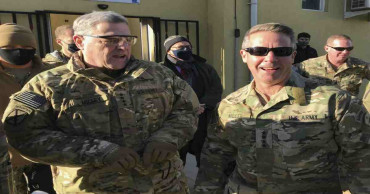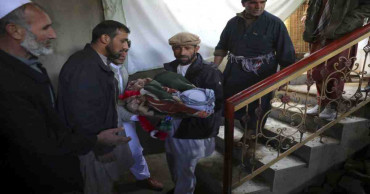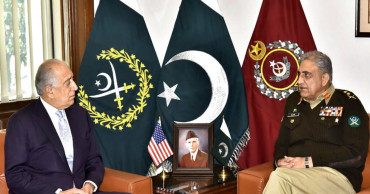peace talks
Ukraine condemns Russian strikes amid peace talks
Ukraine has condemned a fresh wave of Russian attacks that killed one person and injured 23 others overnight, as peace talks with Russia and the United States resumed in Abu Dhabi.
Ukraine’s Foreign Minister Andrii Sybiha described the strikes as “brutal” and said the attacks hit not only civilians but also the peace process. He said the assault showed Russia was not serious about negotiations.
According to officials, one person was killed and four others were wounded in drone attacks on the capital Kyiv. In Kharkiv, Ukraine’s second-largest city, 19 people were injured during heavy overnight strikes, local authorities said.
Kyiv Mayor Vitali Klitschko said three of the injured were taken to hospital. He also said critical infrastructure was damaged, leaving about 6,000 buildings without heating as temperatures remain below freezing.
President Volodymyr Zelensky said Russia mainly targeted energy facilities during the attacks. In Kharkiv, Mayor Ihor Terekhov said a maternity hospital and a shelter for displaced people were damaged.
The attacks came as delegations from Ukraine, Russia and the US held a second day of talks in Abu Dhabi, the first known trilateral discussions since Russia launched its full-scale invasion in 2022.
Ukrainian Defence Minister Rustem Umerov said the talks focused on ways to end the war and move toward a lasting and dignified peace. However, Ukrainian officials said the key issue of territory remains unresolved.
Russia currently controls about 20 percent of Ukrainian territory, including parts of the eastern Donbas region. Moscow wants Ukraine to give up more land, a demand Kyiv has rejected.
With inputs from BBC
1 month ago
Russian attacks kill 1, injure 23 in Ukraine amid peace talks
Russian strikes on Ukraine killed at least one person and injured 23 others overnight into Saturday, as negotiators from Ukraine, Russia, and the United States met in Abu Dhabi for a second day of talks aimed at ending Russia’s nearly four-year full-scale invasion.
Kyiv City Military Administration head Tymur Tkachenko said one person was killed and four others wounded in Russian drone attacks on the Ukrainian capital. In Kharkiv, Ukraine’s second-largest city, drone strikes injured 19 people, Kharkiv Mayor Ihor Terekhov reported Saturday.
The attacks coincided with the continuation of three-way talks in the United Arab Emirates, marking the first known instance of officials from the Trump administration engaging directly with both countries to push for progress toward ending the conflict.
The UAE foreign ministry said the talks are intended “to promote dialogue and identify political solutions to the crisis,” while the White House called Friday’s first day productive.
Diplomatic activity has intensified in recent days, from Switzerland to Moscow, although major obstacles remain, particularly regarding territorial issues. Ukrainian President Volodymyr Zelenskyy told a Davos forum on Thursday that a potential peace deal is “nearly ready,” but key sticking points remain unresolved.
Just hours before the talks began, Russian President Vladimir Putin held overnight discussions with Trump’s envoys Steve Witkoff and Jared Kushner on a Ukraine settlement. The Kremlin maintains that Kyiv must withdraw its troops from areas in the east that Russia illegally annexed but has yet to fully control for any deal to succeed.
1 month ago
Gaza peace talks gain traction on war’s second anniversary
Peace talks between Israel and Hamas resumed on Tuesday at Egypt’s Red Sea resort of Sharm el-Sheikh, coinciding with the second anniversary of the militant group’s surprise attack on Israel that triggered the devastating war in Gaza.
The renewed round of indirect negotiations is centered on a peace plan proposed last week by U.S. President Donald Trump, which aims to end the conflict that has killed tens of thousands of Palestinians.
Senior Hamas official Khalil al-Hayya told Egypt’s Qahera TV that the group seeks guarantees of a permanent ceasefire as part of any agreement involving the release of the remaining 48 hostages—around 20 of whom are believed by Israel to still be alive.
It marked his first public appearance since an Israeli airstrike in Qatar last month targeted him and other top Hamas figures, killing six people, including his son and office manager.
Israeli Prime Minister Benjamin Netanyahu has already accepted Trump’s plan, which calls for the immediate release of hostages, Hamas’s disarmament, and placing Gaza under international administration—conditions yet to be endorsed by Hamas.
Netanyahu’s office said Israel was “cautiously optimistic,” describing the ongoing discussions as technical negotiations on a framework both parties have tentatively approved.
Trump’s initiative has drawn wide international support. Speaking to reporters Monday, the U.S. president said he believed there was a “really good chance” of reaching a lasting peace deal.
Global rallies mark Oct 7 anniversary as Gaza war’s toll deepens, protests grow worldwide
Momentum appeared to build further as Qatar announced that its prime minister and foreign minister, Sheikh Mohammed bin Abdulrahman Al Thani, would travel to Egypt on Wednesday to join the mediation efforts. Trump’s Middle East envoy Steve Witkoff, his son-in-law Jared Kushner, and Netanyahu’s senior adviser Ron Dermer are also expected to participate.
Trump’s peace plan
The U.S.-brokered proposal envisions Israel withdrawing its forces from Gaza once Hamas disarms, to be followed by the deployment of an international security force. The plan also calls for Gaza to come under international governance, overseen by Trump and former U.K. Prime Minister Tony Blair.
In a statement Tuesday, Hamas reiterated its demands for a permanent ceasefire and a full Israeli withdrawal from Gaza, without mentioning the issue of disarmament.
The war erupted on October 7, 2023, when Hamas-led militants stormed into southern Israel, killing around 1,200 people—mostly civilians—and abducting 251 others. Most hostages have since been released through ceasefire deals.
According to Gaza’s Health Ministry, at least 67,160 Palestinians have been killed and nearly 170,000 injured in the ensuing conflict. The ministry does not distinguish between civilians and fighters but says about half of the dead are women and children. The United Nations and independent analysts regard its data as the most credible estimate of casualties.
Gaza peace talks continue on war's two-year anniversary
Several international experts, including those commissioned by a U.N. body, have said Israel’s military campaign amounts to genocide—an allegation Israel vehemently rejects.
On Tuesday, thousands of Israelis gathered at the sites attacked two years ago to commemorate victims and hostages. During the memorial, a rocket fired from northern Gaza exploded nearby, though no damage or casualties were reported.
In Gaza City, residents said Israeli strikes continued until early Tuesday, though there were no immediate reports of casualties.
Humanitarian lifeline in focus
Ahead of the latest talks, U.N. Secretary-General António Guterres described the Gaza conflict as “a humanitarian catastrophe on a scale that defies comprehension.”
Trump’s proposal, he said, “offers an opportunity that must be seized to end this tragic conflict.”
Egypt and Qatar, which have mediated between Israel and Hamas throughout much of the war, are again facilitating the current round of discussions. Qatar’s Foreign Ministry spokesperson Majed al-Ansari said Monday’s talks lasted around four hours.
Witkoff, Kushner, and Dermer are due to arrive in Egypt on Wednesday, according to U.S. and Israeli officials who spoke on condition of anonymity as their trips had not yet been formally announced.
A key element of Trump’s plan is to accelerate the flow of humanitarian aid into Gaza, where over 2 million Palestinians are facing severe hunger and, in some areas, famine conditions.
Source: AP
4 months ago
Head of Myanmar's military government urges ethnic rebels to join peace talks
The head of Myanmar’s military government on Tuesday invited ethnic rebels to hold peace talks to end armed conflict across the country, the second time in less than a month that the ruling generals have publicly promoted negotiations.
Senior Gen. Min Aung Hlaing’s proposal was broadcast on state television on the ninth anniversary of the signing of its nationwide cease-fire agreement. About half of the nation’s 21 established ethnic armed organizations agreed to the pact but some no longer honor it.
Last month, the military announced its most direct invitation for peace talks since it seized power from the elected government of Aung San Suu Kyi in February 2021. It was aimed at the broader pro-democracy forces that have also taken up arms as well as the ethnic groups, but was quickly rejected.
In Tuesday’s brief broadcast, Min Aung Hlaing said the ruling military council will only follow the framework of its existing cease-fire agreement for peace and appealed to the ethnic armed groups to negotiate their issues through dialogue.
“Wishes can’t be demanded through armed violence, but through dialogue at the political table with peaceful means to resolve the conflict,” Min Aung Hlaing said.
Myanmar for several decades has seen a cycle of cease-fires bringing in intermittent periods of relative peace, but none have led to a comprehensive political settlement that would grant the ethnic groups the degree of autonomy they seek in the frontier regions where they are dominant.
The army is currently on the defensive against ethnic militias in much of the country, as well as hundreds of armed guerrilla groups collectively called People’s Defense Forces, formed to fight to restore democracy after the army takeover.
Read: Bangladesh protests killing of Bangladeshi fisherman by Myanmar Navy
Over the past year, the army has suffered unprecedented battlefield defeats, and the initiative seems to be in the hands of the resistance forces.
In October 2015, eight ethnic armed groups signed the cease-fire agreement, and in February 2018, under Aung San Suu Kyi’s civilian government, two more joined.
The cease-fire was seen by the military as a step toward ending the longstanding ethnic rebellions. Maintaining the cease-fire with as many groups as possible is tactically crucial for the military government so it doesn’t have to fight a strong and united opposition.
Some of the largest and most powerful groups, including the Kachin Independence Army and United Wa State Army, did not endorse the agreement, which they viewed as lacking inclusiveness.
Min Aung Hlaing said that some groups that signed it broke the agreement after the 2021 army takeover, aligning themselves with the shadow National Unity Government, the main opposition group against military rule.
Armed militias representing the Karen, Chin and Pa-O minorities, along with the All Burma Students’ Democratic Front, have spurned peace talks.
Read more: Myanmar's military government begins a census seen as a way to gather information about opponents
“I see that what the military is doing is only creating conditions that will prolong the military dictatorship,” said Aye Lwin, the spokesperson of the students’ front. “There is currently no reason to accept the military-led dialogue.”
1 year ago
Governments criticized for keeping women from peace talks
On the eve of International Women’s Day, leading women’s rights campaigners at the United Nations and the African Union and a Nobel Peace Prize laureate criticized male-dominated governments Tuesday for excluding women from peace negotiations.
They complained that governments are ignoring a U.N. resolution adopted in 2000 demanding equal participation for women in talks to end conflicts.
Sima Bahous, head of the U.N. agency promoting gender equality, lamented “the regression in women’s rights.” She told the Security Council that “we have neither significantly changed the composition of peace tables, nor the impunity enjoyed by those who commit atrocities against women and girls.”
Also Read: DigitALL: Role of tech in promoting gender equality highlighted this Women’s Day
Bahous, executive director of UN Women, called for “a radical change of direction.”
She said action should be taken to mandate the inclusion of women at every meeting and in every decision-making process, with consequences for non-compliance. And funds should be channeled to women’s groups in conflict-affected countries where the money is most needed, she said.
The Security Council was assessing the state of the resolution it adopted on Oct. 31, 2000, that stresses the important role of women in preventing and resolving conflicts and demands their equal participation in all efforts to promote peace and security. It also calls on all parties to conflicts to protect women and girls from gender-based violence, especially rape and other forms of sexual abuse.
Also Read: Loss due to women’s exclusion from digital world could grow to $1.5 trillion by 2025 without action: UN Chief
Since the 20th anniversary of the resolution in 2020, Bahous said, Afghanistan’s Taliban rulers have imposed “gender apartheid” and war in Ethiopia’s northern Tigray region reportedly led to sexual violence “at a staggering scale.” Coups in conflict-affected countries in Africa’s Sahel and Sudan to Myanmar have dramatically shrunk the civic space for women’s organizations and activists, she added.
The U.N. Commission on the Status of Women began its annual two-week session Monday focusing on closing gender gaps in technology and innovation. It is also examining digital harassment and disinformation aimed at women that fosters violent misogyny.
Bahous cited a recent study that says politically motivated online abuse of women within Myanmar and from the country increased at least fivefold after that country's February 2021 coup.
“This mainly takes the form of sexualized threats and the release of home addresses, contact details, and personal photos or videos of women who had commented positively on groups opposing military rule in Myanmar,” she said.
Mirjana Spoljaric Egger, president of the International Committee of the Red Cross, addressed the gender-based violence aspect of the U.N. resolution, saying that “more than 100 armed conflicts are raging around the world” and hard-won gains toward gender equality are being reversed.
“This is no coincidence,” she said. “As respect for gender equality declines, violence rises.”
Egger said the Red Cross sees “the brutal impact” every day of “sexual violence at the hands of arms bearers at shocking levels.”
Liberian peace activist Leymah Gbowee, who mobilized street protests against the brutality of the country’s long civil war and shared the 2011 Nobel Peace Prize, told the council that “it has been proven time and again that men do make war but are unable to make peace themselves.”
“Sadly, the conversation is the same in 2023,” she said. “How do we discuss the issue of peace and security and leave out fifty percent of the population?”
Gbowee said that as the U.N. resolution on women, peace and security approaches its 23rd anniversary “investment in its implementation is either stalled or slow.”
Action plans submitted by governments are “a tool for politicians and political actors to window-dress women peace and security issues as they cover up for their failure" to advance women’s rights, she said.
Gbowee called for women peace activists to be part of all peace missions, calling them “custodians of their communities.”
“We will continue to search for peace in vain in our world unless we bring women to the table,” she warned.
Bineta Diop, the African Union Commission chair’s special envoy on women, peace and security, said in a virtual briefing to the council that the current impact of armed conflict on women and girls “is precarious.”
Diop cited kidnappings in the Sahel, rape, killing and maiming of young girls and boys in Congo, and atrocities in the Lake Chad Basin and in East Africa, including “an unprecedented rate of sexual violence.”
“Unfortunately, while many women are engaged in the community and peacebuilding initiatives, their voice is yet to be heard in peace negotiations and mediation where roadmaps to return to peace are drawn,” she said.
Diop said the African Union is helping to promote African women leaders who can sit at peace tables and to bring women from rival regions together, as just happened at a retreat in Pretoria, South Africa, for Ethiopian women.
2 years ago
US Joint Chiefs chairman meets with Taliban on peace talks
The top U.S. general held unannounced talks with Taliban peace negotiators in the Persian Gulf to urge a reduction in violence across Afghanistan, even as senior American officials in Kabul warned that stepped-up Taliban attacks endanger the militant group’s nascent peace negotiations with the Afghan government.
5 years ago
IS attack hits Afghan capital; Pompeo joins peace talks
Mortars slammed into a residential area of the Afghan capital, killing eight people Saturday, hours before outgoing U.S. Secretary of State Mike Pompeo held what are likely his last meetings with the Taliban and Afghan government negotiators trying to hammer out a peace deal.
5 years ago
Warring Afghans meet to find peace after decades of war
After decades of conflict, Afghanistan’s warring sides will open long anticipated negotiations Saturday in search of a lasting peace, reports AP.
5 years ago
US steps up deadly airstrikes, during Taliban peace talks
Washington's peace envoy has traveled to Pakistan to boost regional support for reducing violence in Afghanistan ahead of a final deal to end America's longest war, even as new U.S. air force statistics show the United States dropped more bombs on Afghanistan last year than any year since 2013.
6 years ago







.jpg)








